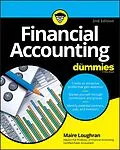Learn to speak fluent finance--and ace your exams!
Warren Buffett said that "accounting is the language of business." And for many accounting and business students, the obscure terminology of accounting makes fluency hard to achieve. Financial Accounting For Dummies can help to demystify abstract concepts in a straightforward, friendly way. With step-by-step examples and real-world scenarios practice, it helps you grasp the fundamentals of accounting until you're ready to interpret, analyze, and evaluate corporate financial statements like you've been doing it all your life.
Packed with easy-to-understand examples, this book takes you from the big three financial statements all the way through to income taxes. Or join the anti-fraud squad by discovering how to spot the ten most common accounting shenanigans.
* Grasp introductory financial accounting course material
* Explore common concepts financial professionals use to compile reports
* Understand leases, free cash flow, and statement analysis
* Learn accounting for small businesses
Whether you're studying for your bachelor's, MBA, or MAcc, you'll find everything you need to speak the language of finance like a native--and use it to get to wherever you want to go!
Autorentext
Maire Loughran, CPA, is a university professor who teaches both undergraduate and graduate accounting classes. She is the author of Auditing For Dummies as well as the previous edition of Financial Accounting For Dummies.
Klappentext
- Create an attractive profile that gets attention
- Market yourself through connections and groups
- Identify potential partners, pals, and investors
Learn to speak the language of business!
It's been said that accounting is the language of business. With this book as your guide, you can become fluent in financeand if you're studying for an MBA or MAcc, that skill will help you pass your exams. In true For Dummies style, this guide cuts through the thick forest of financial jargon to turn abstract concepts into understandable English. Step-by-step examples show you how things work in practice, so you can master the fundamentals of finance, interpret them, and put them to work like a pro.
Inside...
- Get the latest on GAAP
- Grasp mergers and acquisitions
- Understand accounting terms
- Analyze and evaluate corporate financial statements
- Compile financial reports
- Spot common fraud techniques
- Find new career options
Zusammenfassung
Learn to speak fluent financeand ace your exams!
Warren Buffett said that accounting is the language of business.'' And for many accounting and business students, the obscure terminology of accounting makes fluency hard to achieve. Financial Accounting For Dummies can help to demystify abstract concepts in a straightforward, friendly way. With step-by-step examples and real-world scenarios practice, it helps you grasp the fundamentals of accounting until you're ready to interpret, analyze, and evaluate corporate financial statements like you've been doing it all your life.
Packed with easy-to-understand examples, this book takes you from the big three financial statements all the way through to income taxes. Or join the anti-fraud squad by discovering how to spot the ten most common accounting shenanigans.
- Grasp introductory financial accounting course material
- Explore common concepts financial professionals use to compile reports
- Understand leases, free cash flow, and statement analysis
- Learn accounting for small businesses
Whether you're studying for your bachelor's, MBA, or MAcc, you'll find everything you need to speak the language of finance like a nativeand use it to get to wherever you want to go!
Inhalt
Introduction 1
About This Book 2
Foolish Assumptions 2
Icons Used in This Book 3
Beyond the Book 3
Where to Go from Here 4
Part 1: Getting a Financial Accounting Initiation 5
Chapter 1: Seeing the Big Picture of Financial Accounting 7
Knowing the Purposes of Financial Accounting 8
Preparing financial statements 8
Showing historic performance 10
Providing results for the annual report 10
Getting to Know Financial Accounting Users 11
Identifying the most likely users 11
Recognizing their needs 11
Providing information for decision-making 12
Respecting the Key Characteristics of Financial Accounting Information 13
Relevance 13
Reliability 14
Comparability 14
Consistency 15
Accepting Financial Accounting Constraints 17
Considering Your Ethical Responsibilities 18
Following the accountant's code of conduct 18
Having integrity 19
Maintaining objectivity 19
Achieving independence 20
Introducing the Conceptual Framework of Financial Accounting 21
Chapter 2: Introducing the Big Three Financial Statements 23
Gauging the Health of a Business through Its Financials 24
Reporting Assets and Claims: The Balance Sheet 25
Realizing why the balance sheet is classified 26
Studying the balance sheet components 26
Seeing an example of a classified balance sheet 29
Posting Profit or Loss: The Income Statement 30
Keeping a scorecard for business activity 30
Studying the income statement components 31
Seeing an example of an income statement 33
Showing the Money: The Statement of Cash Flows 33
Tracking sources and uses of cash 34
Studying sections of the cash flow statement 34
Seeing a short statement of cash flows 35
Chapter 3: Running the Numbers for Success 37
Identifying Account…
